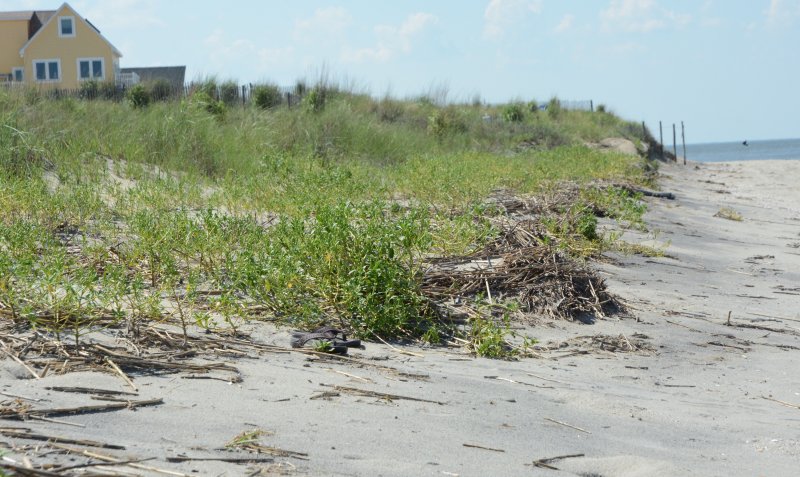Concerns raised over state’s Broadkill dune project
Last month, the state issued a public notice calling for a project in Broadkill Beach that would rebuild the severely eroded beach at the center of the Delaware Bay community by moving sand from the southern portion of the community.
Now, property owners in south Broadkill are speaking out to say moving sand in front of their homes would be a temporary fix that could have significant unintended consequences.
State and federal entities have been working to fortify Broadkill Beach’s shoreline since 1957. There have been 15 beachfill projects, through dredging and trucked-in fill, that have brought nearly 3 million cubic yards to the bayfront town.
Nearly two-thirds of that came from the Delaware River main channel deepening project in 2016. As part of deepening the channel, the state and the U.S. Army Corps of Engineers brokered an agreement to put the spoils at Broadkill Beach. The project widened the beach by 150 feet and added a 16-foot dune.
According to documents found in the public notice, a recent desktop review and subsequent thorough topographic survey suggest the equilibrium shoreline of Broadkill Beach is misaligned with the constructed dune template.
“Currently, there is a near total loss of dune in the central section of the community, particularly near the Route 16 access, while accretion and natural dune formation is occurring in the northern and southern sections of Broadkill,” said a technical narrative prepared in March by the state’s Shoreline and Waterway Management Section.
Property owner Ryan Taylor says that’s not what’s happening. Taylor has owned a house about six-tenths of a mile south of the Broadkill Store at the entrance to the community since 2020. Taylor said the area near the store is losing sand more than his area, but everyone in Broadkill is losing the beach.
As an example, Taylor said there’s a jetty another eight-tenths of a mile south that was completely buried in the 2016 project, but it’s now completely exposed.
Taylor said the natural dunes that have formed seemed to have slowed the regression, but the beach is shrinking every year, not increasing. At high tide this year, there’s not much beach at all, he said.
Additionally, the state’s plans don't provide any detail on how or where it will transport the sand from the southern side of Broadkill, said Taylor.
Bonnie Roberts-Burke and David Burke live a few houses north of Taylor. They’ve been property owners in Broadkill Beach for more than 20 years, which means they had a front-row view of the dune-widening project.
Turning and pointing to the different greenery on the dune, Roberts-Burke said she’s concerned about the environmental and ecological impacts of the project because the wildlife is just beginning to naturally come back. The state wants to take sand away from where things are working, but there’s no guarantee this section of the dune will return, she said.
“Taking sand from here is a short-term fix. We know the sand is going to wash away,” said Roberts-Burke. “We are getting less and less. This is very shortsighted.”
Property owners used to own to the high-tide line, but that changed as part of the agreement with the dune project, said Burke. The government is supposed to be taking care of the dune, not destroying one to temporarily fix another area, he said.
As for fixing the problem north of their homes, Taylor and Roberts-Burke said they would be in favor of contributing to a fund that sees the trucking of sand annually or dredging from the bay.
The bay in front of the dune is getting very shallow because that’s where the sand is going, said Taylor.
Adding to the frustration is the short notice of the project from the state and the quick turnaround on public comment, which ends Tuesday, July 8. Broadkill doesn’t even hold its annual meeting until Friday, July 18, which means it can’t be discussed as a community, said Roberts-Burke.
Chris Flood has been working for the Cape Gazette since early 2014. He currently covers Rehoboth Beach and Henlopen Acres, but has also covered Dewey Beach and the state government. He covers environmental stories, business stories and random stories on subjects he finds interesting, and he also writes a column called Choppin’ Wood that runs every other week. He’s a graduate of the University of Maine and the Landing School of Boat Building & Design.






















































